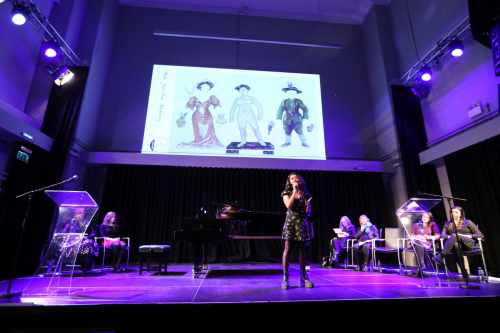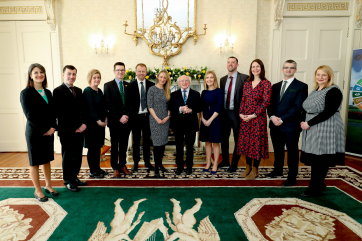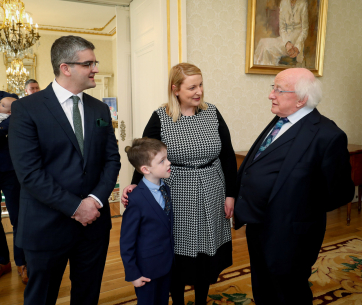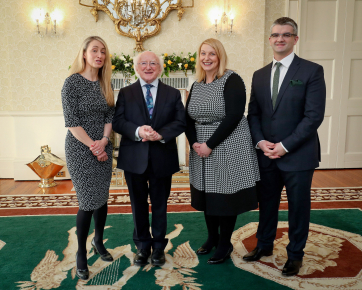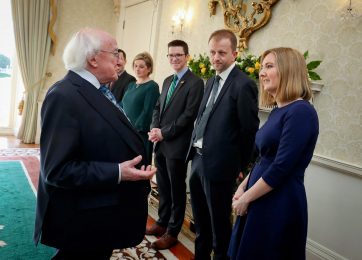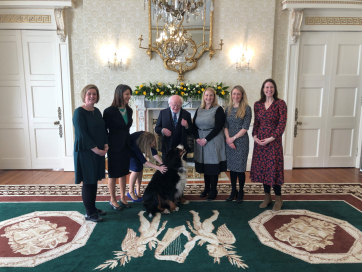Speech at a Reception for Families of Children with Rare Conditions
Áras an Uachtaráin, Saturday, 29 February 2020, 2 pm
Ar an gcéad dul síos ba mhaith liom fáilte chroíúil a fhearadh rómhabh uilig chuig Áras an Uachtaráin agus go háirithe fáilte a fhearadh roimh na páistí iontacha atá bailithe le chéile inniú ar an lá ceiliúrtha seo.
[You are all most welcome to Áras an Uachtaráin. On behalf of Sabina and on my own behalf, I would like to welcome particularly, all the terrific boys and girls who are here with their families.]
May I also welcome the HSE Director-General, Paul Reid.
As I have just said in Irish, today is a happy day where we celebrate our lives and the love and support we have for each other within our families. Today we also celebrate this special community of families who have rallied together in support of each other and who have been working together, not only to help meet the challenges that rare diseases present but also to press for changes to help identify such diseases at a much earlier stage than current practice allows.
Today we mark the thirteenth international Rare Disease Day. We know that the understanding and commitment of policy makers, medical professionals, researchers and decision makers is critical to the prospects and futures of those suffering from conditions which are uncommon and often difficult to diagnose.
The last day of February is always, therefore, such an important date on which organisations around the world hold events to raise awareness of rare diseases.
February 29th is, of course, in itself a rare date and it is appropriate that we mark it here in the Áras by meeting with and welcoming some of the families from across Ireland who have been living with a rare disease.
May I thank especially Lynda and Les Martin, who initiated today’s important event and who are accompanied here today by their children Holly, Cathal and Ciarán. Cathal and Ciarán have both been diagnosed with the rare genetic condition metachromatic leukodystrophy. Their parents have not only courageously shared their story, but they have worked tirelessly to initiate a national conversation that, if responded to, might save many lives and improve the quality of life for many other children in Ireland who are born with rare diseases. Theirs is but one of many stories that are represented here today and of many more being written within families across the country.
We know that with many of these rare conditions early pre symptomatic diagnosis can greatly alter the prognosis for the child concerned while of course, and so importantly, also impacting in a positive way on the journey they and their family will travel in subsequent years.
At its very best, early diagnosis can halt the progression of rare disorders, allowing the children affected to lead improved lives, to grow and flourish and realise all of their wonderful possibilities. However, in all cases it helps to avoid or reduce the exhausting and traumatic experience for parents of trying to get a rare condition diagnosed, of undertaking the stressful diagnostic odyssey of waiting for specialist appointments, navigating a complex medical system and entering that anxious and distressing world of constant tests and medical procedures with no idea of what may lie ahead.
Early diagnosis can also, of course, assist in planning for the future, for example in deciding whether other children in the family need to be tested for an inherited condition and in ensuring appropriate social and educational supports are in place when they are needed.
It allows parents and other care givers an understanding of what to expect in the years to come. It provides space and opportunity to have those important conversations that will ensure critical decisions are made with as much information and reflection as possible, thus ensuring that those decisions will be the best ones possible for the child, the care givers and other children in the family.
All of you here today have had your own difficult journeys to navigate as you came to terms with a difficult diagnosis. You have made, and continue to make, the many complex choices necessary to ensure your child will receive the best care possible.
I know that it has been at times a profoundly lonely journey during which you have often felt isolated, emotionally exhausted, and disconnected from those around you whose understanding of your situation may be extremely limited. For some amongst you, the unpredictability of your child’s condition may make it difficult to organise outings or attendance at social events. Others amongst you may have had to make adjustments to your working lives and career progression, affecting household incomes and future plans. Friendships, relationships, activities and interests may also have suffered as you struggle to meet the daily challenges of caring for a child with a rare condition.
In addition, I have no doubt that the differing nature of your children’s conditions and their varying needs can make it difficult or impossible to find appropriate support groups or connect to other parents whose children are suffering from the same condition.
I would like, therefore, to take this opportunity to commend and thank all those involved with Rare Diseases Ireland who work so hard to voice and represent the views and interests of those affected by rare diseases. Rare Diseases Ireland is creating a sense of community amongst the families who can truly empathise with each other. I know some of you who are here today from before, but each and every one of you are most welcome. The work you do is founded on important values - a sense of compassion, solidarity and empathy. Being united through Rare Diseases Ireland allows so many families affected by different rare conditions to speak with one voice as they seek to have their concerns and needs addressed.
As a society, we always owe a debt of gratitude to those who campaign tirelessly for the creation of a fairer and more equal landscape for our citizens. So often, that campaigning is done by those for whom difficult or distressing circumstances are a lived reality, for whom time is a precious resource, those who wish to ensure that others do not have to struggle as they did, compassionate empathetic parents who have the selfless courage to use their own family experience as a foundation stone on which to build a better future for others.
As President, I meet many inspiring people who have bravely shared their stories and in doing so have initiated important debate, changed minds and policies, allowed something good and enduring to grow in a space that may have been for them one of sadness and loss. By allowing that loss to translate into the gift of a better life for others, they and their loved one make a profound and lasting impact on the landscape of our society.
Last Summer I had the pleasure of meeting with Lynda and Les Martin, when they and their children visited Áras an Uachtaráin. I have been so delighted to have the opportunity to welcome them here again today for this important event shared with so many other families in similar situations.
Les and Linda have generously told their story many times, including recently to a National audience on Nationwide. I know it is not always easy to share those personal stories, but it is that sharing that brings a human dimension to the facts and figures with which we are so often presented, pressing decision makers for a deeper and more empathetic understanding of the realities with which you live.
Your continuous campaigning to increase the number of rare conditions that can be identified as early as possible, at a time when you have so many challenges to meet in your own lives, is both impressive and inspirational. In so doing you have brought this important issue to the attention of politicians, clinicians, patient advocates and the public, both here in Ireland and abroad. We can all be deeply grateful to you for that important work of advocacy on a matter that is urgent and demands a response in policy terms.
I know that many of you have also been telling your own stories in an effort to improve things for your families, for each other and for those who, if a response is made, might yet avoid the challenges that you have faced. I am deeply grateful to all of you for that generous sharing and for coming here this afternoon to stand in solidarity with one another on the journey you and your children face every day.
I truly hope that the progress that has been made to date, and the significant work and campaigning that so many of you continue to undertake, will lead to a positive change in the way in which we diagnose rare diseases, look after those who are diagnosed, and seek to enable all our children to achieve all of their possibilities.
Molaim sibh uilig as ucht bhur gcúram dá chéile, bhur gcur chuige chun athrú dearfach a bhaint amach agus bhur misneach agus sibh ag tabhairt aghaidh ar na dúshláin faoi leith a thagann le galair neamhcoitíanta. Bainigí sult as an chuid eile den lá agus bígí ar bhur shuaimhneas.
It has been a pleasure and an honour to host this event.
Finally, may I thank all those who have helped to make today such an enjoyable and memorable event, especially our entertainers the Fanzini Brothers – Con Horgan and Kim McCafferty, and Rêve – Denise Kelly, Harpist and Ellen Cranitch, Flautist, our first-aider friends from the Civil Defence, and all the staff here at the Áras who have all worked so hard to make today a success. May I also thank Cabra Library who have so kindly provided books and toys for today’s reception, and who do so much to bring the great gift of reading into the lives of our children.
I also thank you for coming here today and please enjoy the rest of the visit.
Beir beannacht.

